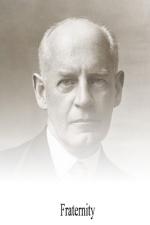“I am not going,” he stammered, “to ask you any more. I could not pry into a private matter. That would not be—–” His voice failed; he looked down.
Hilary bowed, touched to the quick by the return to life of this old man, so long lost to facts, and by the delicacy in that old face.
“I will not intrude further on your trouble,” said Mr. Stone, “whatever it may be. I am sorry that you are unhappy, too.”
Very slowly, and without again looking up at his son-in-law, he went out.
Hilary remained standing where he had been left against the wall.
CHAPTER XXXVIII
THE HOME-COMING OF HUGHS
Hilary had evidently been right in thinking the little model was not speaking the truth when she said she had seen Hughs, for it was not until early on the following morning that three persons traversed the long winding road leading from Wormwood Scrubs to Kensington. They preserved silence, not because there was nothing in their hearts to be expressed, but because there was too much; and they walked in the giraffe-like formation peculiar to the lower classes—Hughs in front; Mrs. Hughs to the left, a foot or two behind; and a yard behind her, to the left again, her son Stanley. They made no sign of noticing anyone in the road besides themselves, and no one in the road gave sign of noticing that they were there; but in their three minds, so differently fashioned, a verb was dumbly, and with varying emotion, being conjugated:
“I’ve been in prison.” “You’ve been in prison. He’s been in prison.”
Beneath the seeming acquiescence of a man subject to domination from his birth up, those four words covered in Hughs such a whirlpool of surging sensation, such ferocity of bitterness, and madness, and defiance, that no outpouring could have appreciably relieved its course. The same four words summed up in Mrs. Hughs so strange a mingling of fear, commiseration, loyalty, shame, and trembling curiosity at the new factor which had come into the life of all this little family walking giraffe-like back to Kensington that to have gone beyond them would have been like plunging into a wintry river. To their son the four words were as a legend of romance, conjuring up no definite image, lighting merely the glow of wonder.
“Don’t lag, Stanley. Keep up with your father.”
The little boy took three steps at an increased pace, then fell behind again. His black eyes seemed to answer: ’You say that because you don’t know what else to say.’ And without alteration in their giraffe-like formation, but again in silence, the three proceeded.
In the heart of the seamstress doubt and fear were being slowly knit into dread of the first sound to pass her husband’s lips. What would he ask? How should she answer? Would he talk wild, or would he talk sensible? Would he have forgotten that young girl, or had he nursed and nourished his wicked fancy in the house of grief and silence? Would he ask where the baby was? Would he speak a kind word to her? But alongside her dread there was guttering within her the undying resolution not to ’let him go from her, if it were ever so, to that young girl’




